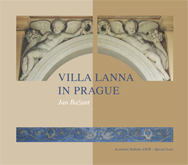 A conference on tackling global threats and a dialogue between cultures was held under the auspices of Foreign Minister Lubomir Zaoralek in the building of the Czech Academy of Sciences and in the Czernin Palace on April 13-14. It was organized by the Centre of Global Studies and the Oriental Institute from the Czech Academy of Sciences, the ambassadors of the Prague Group, and the experts from the Ministry of Foreign Affairs. The conference is one of the Strategy activities which are developed in the research program “Global Conflicts and Local Interactions”.
A conference on tackling global threats and a dialogue between cultures was held under the auspices of Foreign Minister Lubomir Zaoralek in the building of the Czech Academy of Sciences and in the Czernin Palace on April 13-14. It was organized by the Centre of Global Studies and the Oriental Institute from the Czech Academy of Sciences, the ambassadors of the Prague Group, and the experts from the Ministry of Foreign Affairs. The conference is one of the Strategy activities which are developed in the research program “Global Conflicts and Local Interactions”.


Photos: Stanislava Kyselová, Academy bulletin
“The subject of the conference “Overcoming Global Threats: Enhancing Intercultural Dialogue, Stability and Peace” is one of the most important topics today. The reality of series of wars and their consequences, including the destabilization of many countries and the migration crisis, requires new approaches to the problem. It requires a revitalization and reformulation of an idea of dialogue. A dialogue is a very old and useful principle which has helped us to cultivate relations among people from the ancient times till now. The momentous manifestation of the dialogue is an intercultural dialogue which includes also an inter-religious dialogue. In the contemporary times of war problems in the regions around Europe, there is a need of an intercultural dialogue between European and Muslim perspectives.
The scientists can fruitfully help in developing new effective kinds of intercultural dialogue which would be a condition to get a mutual recognition among individuals, social groups, nations and cultures. Then, people can understand and respect each other in a better way, to develop trans-cultural consensus, and enlarge an extra-territorial recognition of various solutions beyond the territories of individual nations and within the United Nations.
Of course, every kind of dialogue has its own preconditions which have to be fulfilled in order to satisfy the basic expectations. The precondition of an intercultural dialogue seems to be a participation of people who would not be repressed. Our country experienced good and bad times, similarly as many other countries, and we have a lot of historical memory to learn from,” said president of the Czech Academy of Sciences Jiří Drahoš.
14 Apr 2016


 Česky
Česky





























